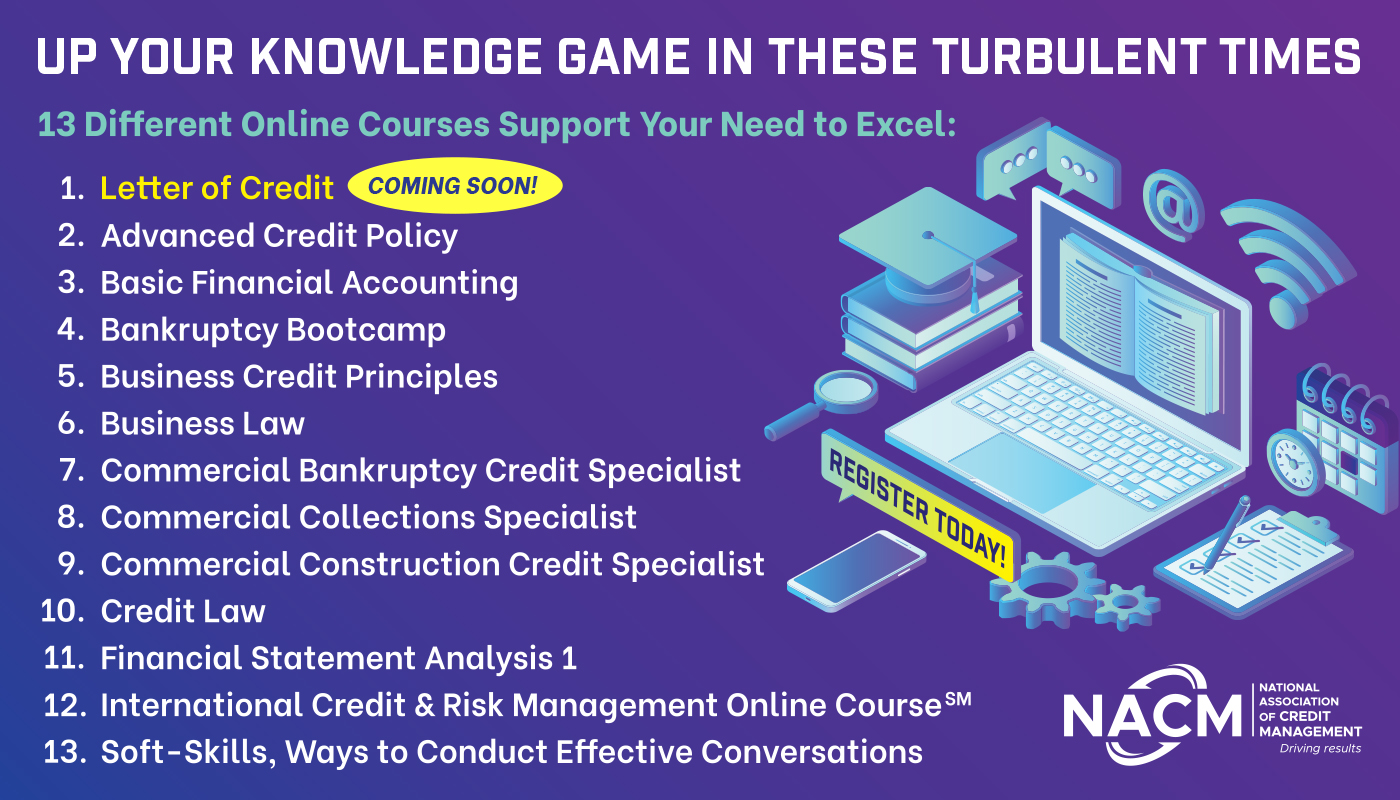eNews October 15
In the News
October 15, 2020
Preparing for the Unforeseen in Credit
—Michael Miller, managing editor
As a credit professional, getting an invoice paid, let alone paid on time is difficult enough. Add a global pandemic and things go awry quickly, putting pressure on all parties involved in a transaction. It is important as a credit department to prepare for the unknown, and if this COVID-19 pandemic had been one of the unknowns prepared for, then credit departments might be better off than their customers and other companies.
“What you did six to nine months ago is having a significant impact on collectability right now,” said Matthew Jameson, Esq., of Jameson and Dunagan, P.C., in “Turning Your AR into Cash During a Pandemic,” during an NACM All South Digital Summit session. “Looking back in time, six to nine months ago, good credit decisions have put you in better situations right now to collect.”
While this pandemic was unforeseen, it is still important to make sound credit decisions, ultimately putting companies in a better position to be paid. Regardless of a pandemic or not, there are certain steps credit department must follow to position themselves into the best possible environment to be paid.
The pandemic has put a strain on payments and collecting for some credit departments, depending on the industry, the customer and the readiness for a black swan event of this magnitude. Several outcomes credit departments are now working through include moratoriums on payments, renegotiations of credit terms and lower payment amounts, noted Jameson.
If credit departments weren’t as prepared in early 2020 to avoid current issues, the good news is they can fix issues going forward to help avoid similar problems in the future. Credit departments with solid credit applications, mechanic’s lien rights, personal guaranties and other securities have options available to them, but those that don’t, have very limited options available.
Credit departments can turn to collections calls or try to cut a deal with a discount; however, Jameson said the latter can send the wrong message or be like betting against yourself. This can be a short-term cash flow solution but not necessarily good in the long term. When making collections calls it’s important to remember the situation the world is in: be sensitive to the economic impact by showing compassion and sympathy. “You want people to get back on their feet; you don’t want to drive customers away. You want them back for more business,” explained Jameson.
There is a strategic approach to planning ahead, and it starts first and foremost with knowing your customer. Second is having a written credit policy to set guidelines on credit and payment terms for customers as well as the course of action for late payments. Every credit policy should hit these four main components: establish a credit standard; determine credit availability; set credit terms for the customer; and define a collection policy.
Having a solid credit application is also key. The credit application acts as an information-gathering tool and a contract for items such as terms and conditions. And because credit departments are taking all the risk, it’s important to make sure business is done on your terms. The basics of a credit application are to make sure it’s filled out 100%; send it back to the customer if it’s not. All they can do is say, “No,” and then it comes down to a business decision, noted Jameson.
Once credit departments have all the information, it needs to be verified. A lot of information can be easily confirmed online. Other key factors to prepare, much like preparing an earthquake or hurricane kit, are the personal guaranty and a promissory note. Both are other avenues for collection on a past due account. Personal guaranties should have a printed name and signature, without the guarantor’s title, as well as the Social Security number, date and a potential witness signature.
The promissory note is an unconditional promise to pay a fixed amount of money. This is used when a settlement is reached with the customer on past due balances but before a lawsuit is filed. This allows parties to agree to an amount and pay schedule, while eliminating any underlying issues with the transaction, such as invoice inaccuracies, problems with products, etc. There are limited defenses, which include a four-year statute of limitations, being fraudulently induced into signing and the signature is from a person not authorized to sign the promissory note.
One of the final potential steps to collect payment is placing accounts for collection.
“The very best credit departments have set policies and procedures—they are mechanized,” Jameson said. While hindsight can be 20/20, the vision of credit departments must always be toward the horizon, watching out for the next red flag that will cause hiccups to the payment process.
Should You Ask Away or Walk Away in a Negotiation?
—Linda Swindling, JD, CSP
Have you ever placed pressure on yourself to make a deal work or come to an agreement when it didn't feel right? Whether it is a professional or a personal matter, you lose your power when you are unable to walk away.
Sometimes you have to walk away but not as often as you might think.
How do you determine whether you have hope in reaching an agreement and should continue discussions or whether you are wasting your time?
In my book, Ask Outrageously: The Secret to Getting What You Really Want, you're given ways to decide when to stay engaged, postpone communications, or detach completely.
Ask Away
Are your requests heard and are discussions moving in a positive direction? Keep at it and continue to ask when the other person:
- Asks how you arrived at your conclusions or your thinking.
- Exhibits body language which shows the person is listening, taking in your points and considering your requests.
- Disagrees with you but isn't disagreeable.
- Discusses information in a rational and respectful manner.
- Educates you on something new or describes a policy and/or you are gaining information.
- Knowingly or unknowingly is teaching you about the process or players involved.
- Agrees he/she wants to work together just not sure how.
If someone is not agreeing or committing but continues to listen and participate in the conversation, stick around to find if you can reach common ground. Later if you leave the negotiating table, you depart with a clean conscience knowing you made a solid effort.
Walk Away
Are you sensing your conversation is not productive or headed nowhere right now? It's time to leave if the other person:
- Clearly has no power or authority to say "yes" or even influence a yes.
- Would face a reprimand or could lose their job over your request by violating policy.
- Begins acting obnoxiously or is rude or disrespectful.
- Begins packing up to walk away. Take it as a sign. Grab your items and say, "It's time to break our conversation up."
- Lies to you. If you decide to stay, proceed with great caution and require confirmation of any promises made.
- Sets you up to look bad or to make a mistake.
- Is on a fishing expedition looking for information and not sharing in exchange.
- Creates roadblocks leaving you no productive way to get your interests met.
Stop and say, "It's time for a break," or "Let's postpone and talk later." Then, politely excuse yourself. When you are away from the pressure of the moment, you can determine if reconvening makes sense.
Run Away
Are you uncomfortable personally or professionally? Exit quickly if the other person:
- Makes you feel unsafe.
- Responds in a way that asks you to sacrifice ethics or morals.
- Suggests that you do something that is against company policy or is illegal.
Know your non-negotiables. Your employment, reputation, physical safety and mental health are not worth risking.
Negotiate Your Way
Identify when it makes sense to stay involved, even if the discussions are taking longer or not following your precise plan. At the same time, remember experienced negotiators know that postponing conversations and even withdrawing entirely is part of the secret to getting what you really want. Life is a series of negotiations. You are the decision maker in your life and get to choose whether you stay the course, delay your discussions or pursue other avenues.
Be willing to walk away to get what you really want!
Negotiation speaker, author and expert Linda Swindling, JD, CSP, helps leaders negotiate everything from big deals to workplace drama using proven strategies that drive results without driving others away. Linda helps leaders enhance business relationships; improve sales opportunities; communicate more effectively so they are heard and understood; and to have the courage and confidence to ask outrageously to get what they really want. To view the full article and more, go to https://www.lindaswindling.com/.
Not a Lot of Faith in a Quick Recovery
—Chris Kuehl, Ph.D., NACM Economist
The latest survey of economists conducted by the Wall Street Journal paints a grim picture. Over the years, respondents have tended toward a more cautious and conservative view of the economy, and that seems to be the case with the latest set of surveys. While there has been lots of conversation regarding an economic recovery starting in 2021, the latest poll indicates that almost half of the respondents think that employment numbers will stay down until at least 2023. The very slow pace of recovery for the overall labor market will create a very slow response for the entire economy as it will mean continued unease among consumers and within the workforce as a whole.
Employment is crucial to the progress of an economy; the importance of employment is also complex. Economists want people to have jobs and good jobs so that they can be good consumers. The producers in an economy need people to consume what they are producing—it is that simple. The status of one’s job will play into one’s willingness to do that consuming. The better paying the job, the more consumption and the more secure the job, the more consistent and future oriented the consumption. People who are not sure they will stay employed will not buy houses or cars or any other expensive item. This is why the rates of joblessness are so important. One would assume that if over 90% of the eligible population was working and consuming that this would be enough to power the economy, but the fact is that many of those employed may not feel very secure about their job prospects when the overall rate of unemployment rises. They become cautious and reduce their levels of consumption, and that sets a cycle in motion. The reduced consumption weakens the economy, and that results in more layoffs.
The assessment of the economists polled is that the majority of those who have lost their jobs due to the lockdown this year are in a very poor position. They lack the skills and education to explore new job opportunities. The impact of the lockdown has fallen hardest on those who are in the low-wage service sector—hospitality, entertainment, food service and personal services. These were the sectors that were shut down first and have largely remained shut down. The people that worked for these businesses were thought to have been better classified as having been furloughed, but that has not turned out to be the case. They have now been out of work for months, and the companies they once worked for have vanished. Their options now are very limited. They can keep waiting and hoping that their old jobs come back, they can try to retrain or get the education they need to explore a new job or they can remain dependent on some kind of government or private aid.
The long-term solution is training and education, but this has never been an easy undertaking. The people who are getting training have to be able to make a living while they are learning, and that generally means that training will take a long time as it will be acquired in a part-time process. Then, there is the choice of what kind of training. There is no guarantee that education or training will pay off as there will be competition from others who are getting that same training, or there may be limited demand for the new skill in the place that person lives. Today, there are other challenges. Many of the skills most needed do not lend themselves to the kind of virtual education that has been required in a pandemic atmosphere. These are hands-on jobs and require hands-on education. There are not enough training centers and schools to accommodate the need, and there is always the issue of cost. How does the unemployed person afford to pay for this training, and if they are not able to, who will pay for that skill development?
Latest Recommendations to Combat Fraud: Increase Online Meeting Security, Customer Communication
—Andrew Michaels, editorial associate
Since the onset of COVID-19, pandemic-related fraud has skyrocketed in the U.S., ranging from fake CDC informational emails to phishing scams offering economic stimulus funds. According to data from the Federal Trade Commission (FTC), there have been over 184,000 cases of fraud reported as of Aug. 31, with losses exceeding $124 million. There’s nothing fraudsters won’t do to access finances, so Nacha and its Payments Innovation Alliance are fighting back with the release of its “COVID-19 Best Fraud Prevention and Cybersecurity Practices” report.
Before launching any initiatives to prevent fraudulent activity, businesses must first recognize how they’re being infiltrated, i.e., phone, website, email, mail, etc. In its analysis of FTC data, the Ascent found fraud via websites and emails resulted in the most financial losses at nearly $21,000 and $19,000, respectively, while the most common method of contact for fraud reports was phone calls. Although still high, the number of fraud reports and total losses were lower in regard to consumer-initiated contact, mail and other methods.
“Threat-aware employees are the first line of defense against cyber intrusions,” PricewaterhouseCoopers said in response to the increasing reports of pandemic-related fraud. “Too often, that defense needs strengthening. … As has been proven time and time again, it only takes one. One click, one missing endpoint agent, one failed alert, one unsuspecting employee, and the adversary can proclaim victory over your network.”
One of the most recent reports addressing the issue was released by Nacha and its Payments Innovation Alliance in August, discussing how businesses can combat fraud and take into account the changes in operations that come from working at home. Among the report’s 10 recommendations was increasing security for online meetings. Video conferencing platforms, such as Zoom, have become go-to tools for companies around the world in the shift from in-person to online meetings. However, incidents of “Zoom bombing” have occurred in which an uninvited participate gains access to confidential calls. Nacha states companies can prevent impeding parties by requiring passwords to join.
“Users can take additional steps to further ensure the integrity of their online meetings by designating co-hosts or moderators to monitor the chat room and step in, if necessary,” the report notes. “Users can take advantage of enhanced privacy features like a virtual ‘waiting room’ that lets hosts see who is attempting to join prior to allowing access. Also, users are encouraged to generate random meeting links for extra privacy.”
Businesses must extend fraud prevention efforts to their customers as well, Nacha states, by establishing clear lines of communication. Unfortunately, many fraudsters will do their due diligence when sculpting fake emails and phone calls that appear to be on behalf of the business. Nacha’s example of improving customer communication involved informing customers of “new programs and promotions,” effectively sharing information that criminals will have no way of knowing. Therefore, if a customer sees contradictory information, they will know what information is true and false.
“For example, if insurance companies are providing rebate checks to customers, the company should inform recipients that a paper check will be sent and caution customers not to provide personal information in response to phishing emails that promise electronic deposits,” the report states.
By not only opening the lines of communications with customers, but also increasing the amount of overall communication, businesses can ensure their customers also remain safe.
For more information, check out the COVID-19 Best Fraud Prevention and Cybersecurity Practices report.
|
-Date & Time Title Speakers
OCT 20 10AM ET
Eva Knickenberg-Giardina, CLG Cocuzza & Associati Studio Legal Milan, Italy OCT 21 3PM ET
Michael Flum, CreditRiskMonitor, Inc. Valley Cottage, NY OCT 22 11AM ET
Ed Bell, CBA, ICCE W.W. Grainger, Inc. Phoenix, AZ
Esther Hale, ICCE Phillips 66 Company Bartlesville, OK OCT 27 11AM ET
Syed Ghani, CBA (Credit) Ascend Performance Materials Houston, TX
Virgile Rouyer (Sales) Ascend Performance Materials SPR Mont-Saint-Guibert, Belgium OCT 28 3PM ET
Bill Weiss HighRadius Houston, TX |






